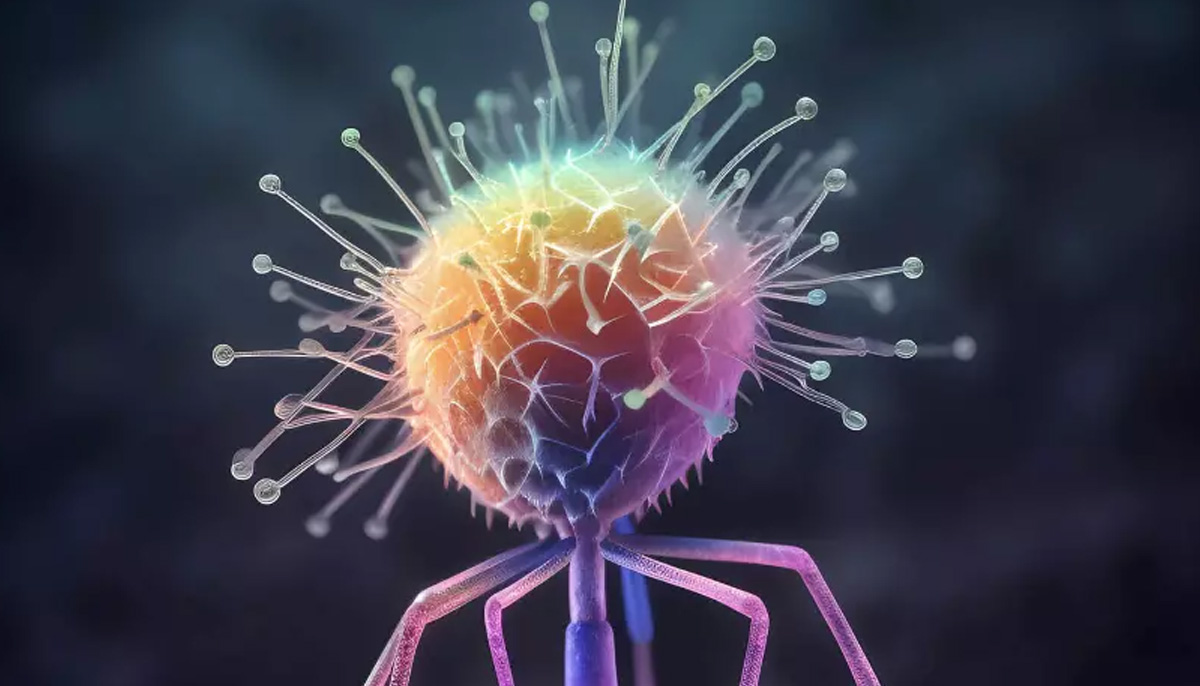How top 10 emerging technologies of 2023 can revolutionise Pakistan?

The World Economic Forum's 2023 Report on the Top 10 Emerging Technologies highlights groundbreaking innovations with global implications. These technologies span healthcare, AI, sustainability, and flexible electronics. Pakistan must grasp their importance.
These technologies offer Pakistan opportunities in healthcare, agriculture, education, and sustainability. Yet, Pakistan needs to invest in research, infrastructure, and education. Collaboration between the government, private sector, and civil society is vital for inclusive progress.
While some technologies originate elsewhere, their impact on people, prosperity, and equity matters globally. Pakistan's role in adopting and adapting to these technologies and innovating with them is crucial.
For instance, AI and generative AI can transform healthcare and education in Pakistan, while sustainable aviation fuel and computing align with Pakistan's climate goals.
The World Economic Forum's selection of these technologies recognises the interconnectedness of innovation. Pakistan should align its strategies with these innovations to contribute globally and benefit from a more connected and prosperous future.
Flexible batteries: Powering innovation
Pakistan, like the rest of the world, is witnessing a surge in wearable devices, flexible electronics, and bendable displays. These innovations require adaptable power sources, making standard rigid batteries outdated. Enter flexible batteries, a significant leap towards a more versatile future.
Flexible batteries revolutionise energy storage. Lightweight and easily bent, they offer portability and convenience. These rechargeable batteries come in various types, including lithium-ion and zinc-carbon systems, with conductive polymer current collectors. Some even have additives for improved conductivity and flexibility.
The real innovation lies in the electrodes. Flexible battery electrodes can be coated with materials like graphene, carbon fibres, or cloth, enabling diverse applications.

In Pakistan, flexible batteries have promising applications in healthcare and e-textiles.
a) Healthcare: They power wearable medical devices and sensors, enabling wireless health data transmission for remote patient monitoring, especially beneficial in rural areas.
b) E-Textiles: Imagine clothing that monitors your health. Flexible batteries can power textile-based electronics, revolutionising Pakistan's textile industry.
The global flexible battery market is set to grow by $240.47 million from 2022 to 2027, with a 22.79% annual growth rate. Pakistan's interest in wearable tech aligns with this trend.
Generative AI: Transforming innovation landscape
Generative AI is revolutionising creativity and innovation in Pakistan. This AI subset, capable of generating text, programming code, images, and sound, has diverse applications, from healthcare to architecture and engineering. Understanding its implications in Pakistan is crucial.
Generative AI learns from data patterns using complex algorithms, offering adaptability for various sectors. In healthcare, it can accelerate drug discovery, benefiting Pakistan's healthcare challenges. Architects and engineers can use it to create imaginative designs and enhance construction processes, potentially transforming urban planning.
NASA's use of generative AI for scientific advancements can inspire progress in Pakistan, from space exploration to local research initiatives. The National Aerospace Technology Parks in collaboration with the Pakistan Airforce and Ignite can foster this technology's growth.

Even the food industry and consumer products like furniture could innovate with generative AI in Pakistan's diverse market.
Generative AI can revolutionise education, offering personalised curricula for students. However, imaginative public policies and innovative leadership are necessary for successful implementation.
In the workplace, AI-based models like ChatGPT enhance productivity, particularly in Pakistan's growing IT sector.
While generative AI holds immense potential, addressing job displacement through upskilling and reskilling is essential.
Ensuring ethical AI use, transparency, and privacy protection is crucial. Policymakers should develop clear ethical guidelines and governance structures.
Sustainable aviation fuel: A green flight path
Pakistan, facing severe climate change impacts, seeks innovative solutions to cut carbon emissions. The aviation sector, contributing 2-3% of global CO2 emissions, is a prime focus. Sustainable aviation fuel (SAF) offers promise for reducing emissions, particularly in Pakistan's climate-vulnerable context.
Aviation's CO2 emissions are alarming, demanding immediate attention. Electric or hydrogen-powered planes face hurdles for long-haul flights. SAF provides a practical solution without the need for major infrastructure changes or fleet replacements.

SAF, derived from biological and non-biological sources, combined with efficiency improvements and carbon offsets, can lead the aviation industry toward net-zero emissions.
Currently, SAF represents less than 1% of global jet fuel demand. Achieving 13-15% by 2040 is vital for net-zero aviation by 2050. Pakistan can contribute in several ways.
Challenges like raw material availability and green hydrogen production need attention, with potential solutions in engineered microorganisms for biomass breakdown.
Designer phages: Innovating health, agriculture
With a youthful population of 250 million, Pakistan faces healthcare and agricultural challenges. Designer phages, and engineered viruses, offer solutions for microbiome-related diseases and agriculture, transforming Pakistan's future.
Designer phages reprogram bacteria within the human microbiome, offering the potential to treat diseases like HUS caused by E coli. In Pakistan, they can improve healthcare access, particularly for prevalent infections.

Pakistan's agriculture, a vital sector, can benefit from designer phages. They can boost livestock growth, combat plant diseases, and enhance food safety, aligning with the "One Health" approach.
For Pakistan's youthful population seeking innovative healthcare and agriculture, designer phages offer hope. These technologies can make treatments efficient and sustainable, driving progress and prosperity.
Metaverse for mental health: A solution for youth's struggles
Pakistan, with a population of 250 million, faces complex mental health challenges, especially among its 60% youthful population. The metaverse offers a unique solution to address these issues, exacerbated by the "Great Resignations."
Pakistan's youth encounter various mental health pressures due to academic, social, and digital demands. Increased screen time and the Great Resignations have added to their anxiety.
The mental health crisis in Pakistan affects an estimated 50 million people, largely due to stigma, awareness gaps, and a lack of services. Mental health remains under-resourced, with just 500 psychiatrists for the entire country.

Technology can play a crucial role in addressing mental health issues, with gaming platforms already being used for treatment. In Pakistan, where economic uncertainties amplify the crisis, the metaverse can offer a lifeline. As interface technologies evolve, they can enhance social connections and even integrate with neurotechnologies for real-time emotional feedback.
Leveraging the metaverse to address mental health needs in Pakistan can be transformative. It supports the well-being of the youth and showcases innovation in tackling societal challenges.
Wearable plant sensors: Transforming agriculture
In Pakistan, agriculture is vital to the economy, contributing 22.9% to GDP and employing 37.4% of the workforce. Challenges like extreme weather events threaten food security. Wearable plant sensors offer a technological solution to enhance resilience and productivity.
Traditional crop monitoring methods are costly and time-consuming. Recent advancements include sensor-equipped drones and tractors for better insights. The next step is monitoring individual plants.

Wearable plant sensors are compact devices that attach to crops, providing continuous data on temperature, humidity, moisture, and nutrients. They offer benefits like optimised yields, resource efficiency, early disease detection, and data-driven decisions.
However, challenges include installation and maintenance costs and data interpretation. Further research is needed to understand their long-term effects on plant growth.
Despite challenges, wearable plant sensors can revolutionize Pakistan's agriculture.
Spatial omics: Illuminating molecular mysteries
The human body consists of 37.2 trillion cells working together, a scientific quest for understanding. Spatial omics, a transformative tool, holds promise for Pakistan, a country with healthcare challenges and research opportunities.
Spatial omics combines advanced imaging and DNA sequencing to map molecular-level biological processes. It involves slicing tissues into thin sections and using groundbreaking imaging to pinpoint biomolecule locations.

To make spatial omics accessible in Pakistan, technology democratization and scaling are essential. The global spatial omics market was valued at $232.6 million in 2021, with projected revenues of $587.2 million by 2030. Addressing technical challenges related to data is crucial.
In Pakistan, where healthcare research and innovation are vital, spatial omics can address challenges and deepen scientific knowledge.
Flexible neural electronics: Bridging humans, machines
Brain-machine interfaces (BMIs) hold promise for controlling machines with thoughts. They capture brain-generated electrical signals and translate them into computer commands. While BMIs have advanced in treating epilepsy and neuroprosthetics, there are challenges due to rigid implant materials.

Flexible brain-interfacing circuits offer hope. They use biocompatible materials, conform to the brain's shape, reduce scarring, and can accommodate multiple sensors. This surpasses traditional hard probes.
In Pakistan, where healthcare and innovation are vital, flexible neural electronics can blur the line between humans and machines. They offer enhanced healthcare solutions and groundbreaking discoveries.
Sustainable computing for data future
Data centres, essential for services like Google, consume 1% of global electricity, a figure set to rise. Net-zero-energy data centres are the goal, achievable through emerging tech and AI optimising energy use.
AI, exemplified by DeepMind, reduces data centres' energy consumption by up to 40% without performance loss. Modular, demand-responsive infrastructure, including cloud and edge computing, spreads data processing across devices and locations.

To achieve net-zero-energy data centres in Pakistan, innovative integration with new energy tech is crucial. Lahore, Karachi, and Islamabad host a total of 21 data centres, highlighting digital infrastructure's growth.
AI in healthcare: Transforming health systems
The COVID-19 pandemic exposed weaknesses in Pakistan's healthcare systems, prompting the exploration of AI and ML in healthcare, as seen in initiatives like AI4PEP. These efforts aim to predict and manage pandemics better while expanding healthcare access.
By leveraging AI and quality data, Pakistan can optimize resource allocation, reducing wait times and improving care, as demonstrated in Canada. AI can also enhance healthcare delivery to underserved areas, taking cues from India's success in reaching remote communities.

However, AI in healthcare must address privacy, public acceptance, compliance, and security concerns. Balancing innovation and ethics is crucial, necessitating legal frameworks to guide responsible AI use.
In the coming years, AI-facilitated healthcare can make a significant impact in Pakistan, particularly benefiting underserved populations.
These innovations address critical challenges, offer economic opportunities, and position Pakistan as a forward-thinking player on the global stage, contributing to progress, prosperity, and sustainable development.
Amir Jahangir is a global competitiveness, risk, and development expert. He can be reached at [email protected] and tweets at @amirjahangir
— Thumbnail and header image by Unsplash




